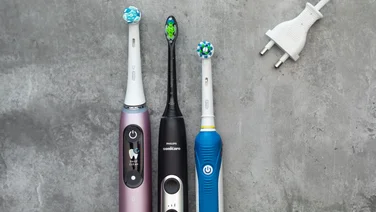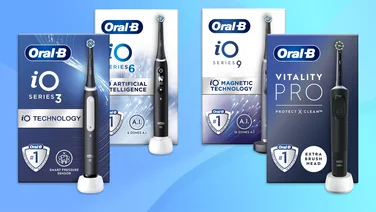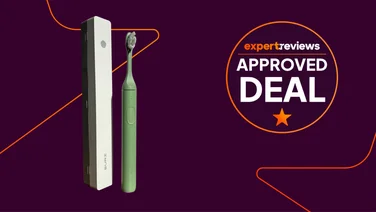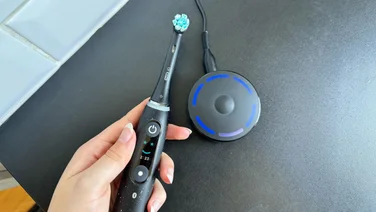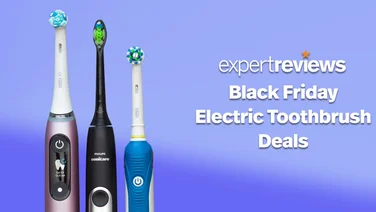To help us provide you with free impartial advice, we may earn a commission if you buy through links on our site. Learn more

Mouthwash is a staple of any good oral hygiene routine: it reduces plaque (the sticky deposit that builds up on your teeth where bacteria multiplies), freshens your breath and kills bad bacteria. But some people still wonder if using mouthwash is bad for you. Read on to brush up on the facts.
What’s actually in your mouthwash?
The key ingredient in your mouthwash is fluoride, which strengthens tooth enamel by helping it form a stronger crystal lattice that’s more resilient to tooth decay from bacteria. Other ingredients include germicides, antimicrobials and active antibacterial or antiseptic agents like sodium chloride and sodium bicarbonate (which acts like a cleaning agent) to combat bad breath. Finally, cetylpyridinium chloride (CPC) is an antiseptic that’s also found in toothpaste (as well as lozenges and breath and nasal sprays) which helps to inhibit the growth of plaque.To do their job properly, these active ingredients need a carrier/vehicle, which is often ethyl alcohol (meaning that most mouthwash is mildly alcoholic). While the alcohol percentage isn’t anywhere near enough to get you drunk, it does explain that slight “burning sensation” when you first swill mouthwash around your gums. The alcohol is able to kill off some bad bacteria, though swilling it around your mouth may kill off some “good” bacteria too.
So while daily use of a mouthwash is safe enough, it’s not a good idea to expose your mouth to these ingredients more than twice a day – particularly if you’re using an alcohol-based formula. If you’re after more information, read our full article on when to use mouthwash.
Luckily, alcohol-free mouthwashes (see below) are on the market too for people who prefer to avoid alcohol or find the regular formation too harsh. We recommend Colgate Plax Soft Mint which our reviewer noted has “an easy-going minty flavour, without a hint of sting”.
READ NEXT: Best electric toothbrushes
Does using mouthwash have any side effects?
We spoke with Dr Mani Bhardwaj, principal dentist at The Smile Studios Dental Group, who told us about the potential side effects that people might experience with an alcohol-based mouthwash, including a dry mouth, bad breath and increased tooth sensitivity. The alcohol could also weaken tooth enamel over time, and in some extreme cases, potentially lead to cavities and mouth ulcers.
Are there any alternatives to alcohol-based mouthwash?
Using an alcohol-free mouthwash is usually considered a safer bet for your teeth in the long run. It’s gentler and less likely to damage teeth and gums – but note that it’s also not as effective as its alcoholic counterpart.

Medical grade mouthwash is available for those with various dental conditions like gum disease and ulcers. These antibacterial chlorhexidine-based mouthwashes are typically only available with a prescription from your dentist or GP, and can help to soothe gum inflammation (“gingivitis”). However, they don’t provide any protection for your teeth against plaque like “regular” mouthwashes do, so if you use one of these, brushing and effective flossing are still very important.
There are plenty of mouthwashes designed to whiten teeth, though these have their own potential side effects. Some users have reported mouth swelling and irritation, numbness and an unpleasant or vaguely chemical aftertaste.
Gargling with plain old salt water can do the trick too. To make a homemade mouthwash, dissolve a teaspoon of salt in half a cup of warm water and swish it around to help promote healing and control the bad bacteria in your mouth and gums.
READ NEXT: Best Oral-B electric toothbrushes
Can you swallow saliva after using mouthwash?
Mouthwash is designed to be spat out, but it’s fine to swallow the saliva in your mouth after you’ve done the spitting part.
Just try to avoid swallowing the actual mouthwash if possible – not just because of the alcohol, but due to the other ingredients in there (for instance, swallowing fluoride can give you an upset tummy).
Is there anyone who shouldn’t use mouthwash?
It’s not a good idea for children under six to use mouthwash designed for adults. Those with a compromised immune system should also refrain and anyone with alcohol dependencies or in recovery should avoid the alcohol-based formula and use the alcohol-free alternative. If using mouthwash isn’t for you, then there are alternatives you can use to keep your teeth clean and healthy, such as a water flosser, a sonic toothbrush and of course, changing your toothpaste.

